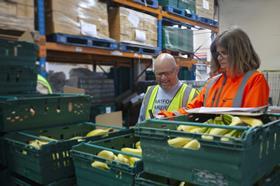
Leading UK produce supplier Minor Weir and Willis (MWW) has cut tonnes of food waste and helped to provide 47,620 meals for people in need by harvesting and packing up ‘wonky’ fruit and vegetables to be redistributed across the UK by food charity FareShare.
MWW accessed funding from FareShare’s latest 'Surplus with Purpose Fund' making it cost neutral for the company to harvest, sort, pack and transport fruit and vegetables deemed too big, too small or too blemished for supermarkets – and send it to FareShare.
FareShare is the UK’s largest food redistribution charity, with 21 regional centres across the country. It takes food from the food industry that can’t be sold, either because of packaging errors or a short shelf life. The food is then redistributed through a network of 11,000 frontline organisations across the UK, such as homeless hostels, school breakfast clubs, domestic violence refuges, older people’s lunch clubs, food banks and hospices.
Over 20 tonnes of MWW's sugar snap peas, green beans, apples, sweet potatoes and mangoes have all been saved from waste and sent to FareShare so far. Previously the food would have been sent to anaerobic digestion or ploughed back into the fields.
Defra provided a grant of £1.9 million towards FareShare’s Surplus with Purpose Fund, as part of its £15 million scheme launched in January to help redistribution organisations across England to help overcome barriers to getting food currently going to waste onto people’s plates.
FareShare CEO Lindsay Boswell said: “Before launching the Surplus with Purpose Fund, accessing fresh produce straight from farmers’ fields was a real challenge due to the labour and costs involved.
“This fund now means we’re stepping up our support to suppliers like MWW to help them redistribute what has previously been harder to reach surplus food – at no additional cost to them - and ensure it gets onto the plates of people who need it most.”
The £3 million FareShare Surplus with Purpose Fund is open to new companies, as well as companies already working with FareShare that would like to redistribute additional surplus food. It can also be used to unlock harder to reach surplus food, such as food found further up the supply chain.
Companies could be eligible for up to £50,000 funding which can cover additional staff costs needed for packing and sorting, in building and implementing new processes, packaging and transportation costs, or lost income from the sale of surplus to animal feed or anaerobic digestion.
A spokesperson for MWW said: “Working with FareShare is real hands-on CSR – it’s great for the company and certainly creates a real feel good factor. Staff can see that as a business we’re actively doing something and being responsible with our waste.
“I’d recommend any UK grower to contact FareShare and see what they can do to help. They should be donating to FareShare as the norm - there’s no reason we should be ploughing back good quality edible food into the ground.”
To find out more about the FareShare Surplus with Purpose Fund go to www.fareshare.org.uk/surplus



